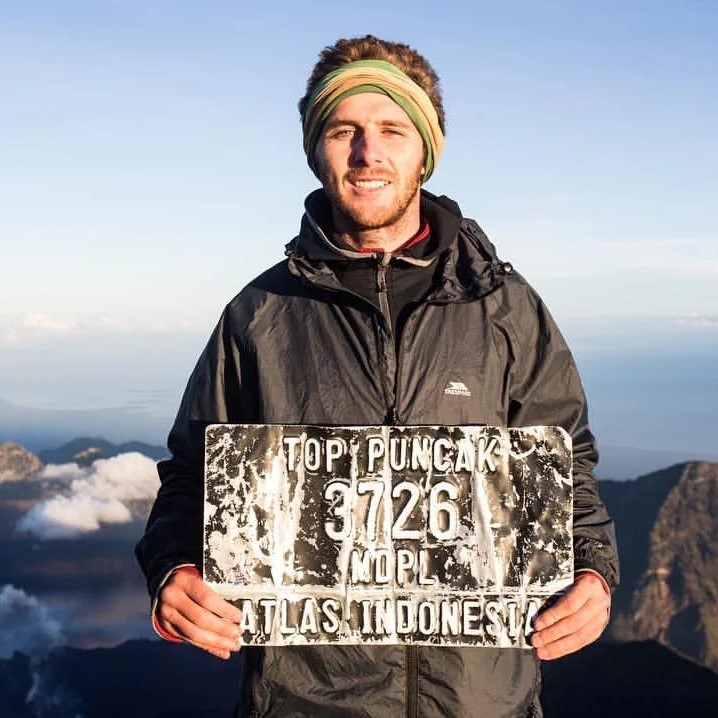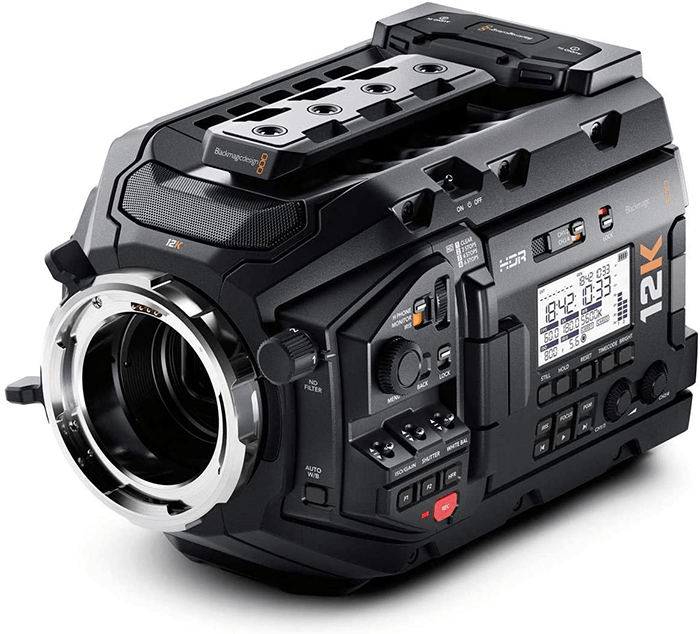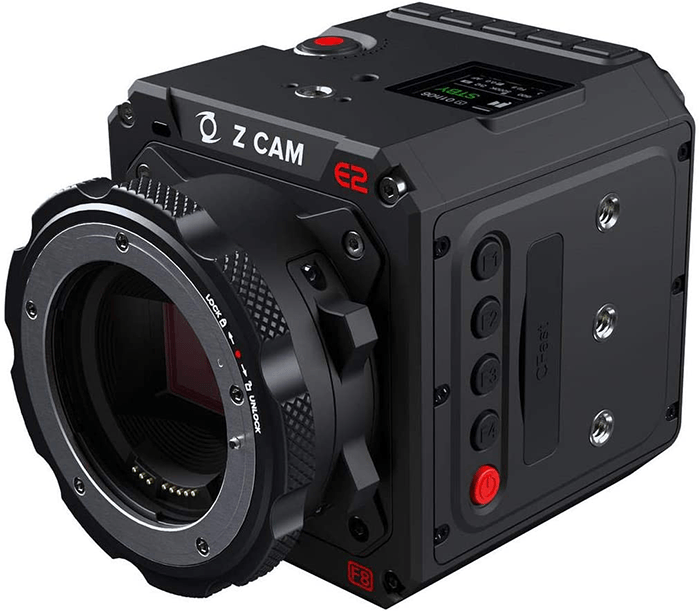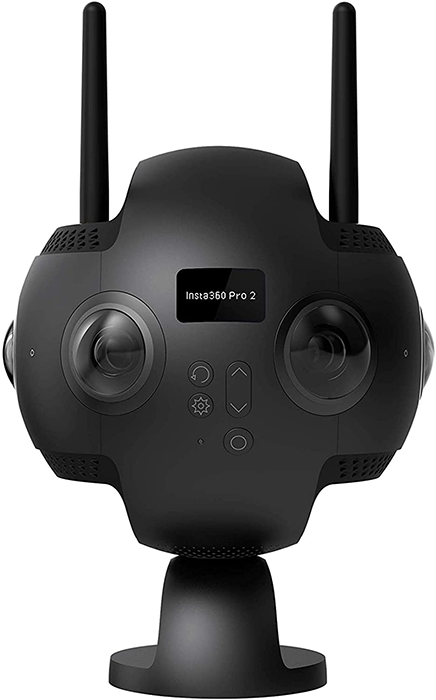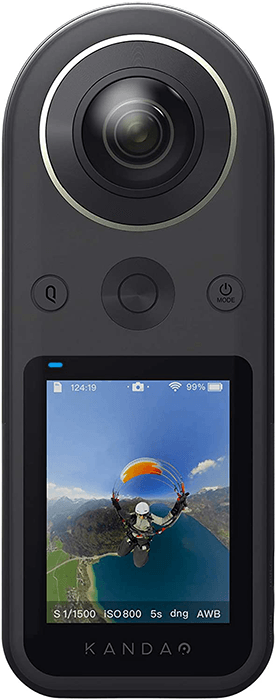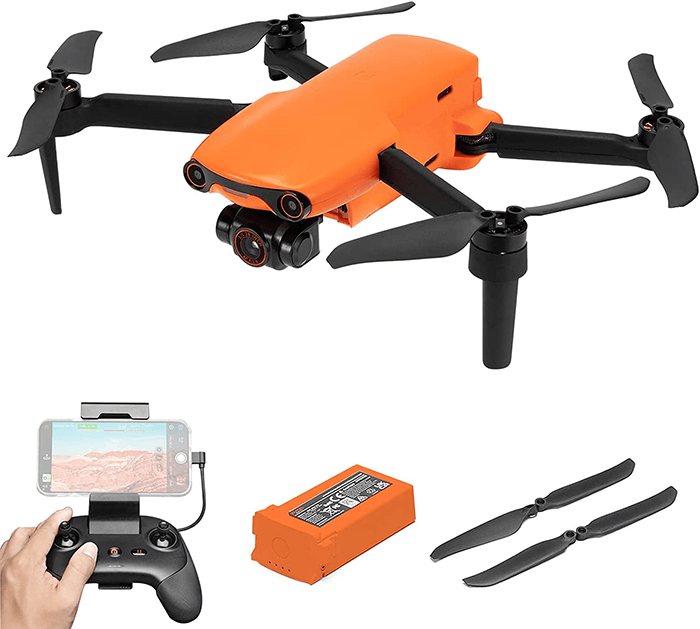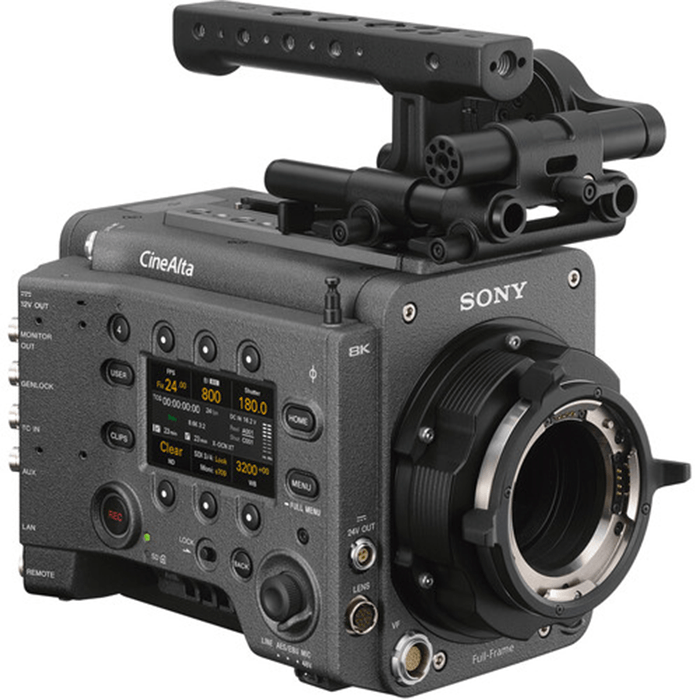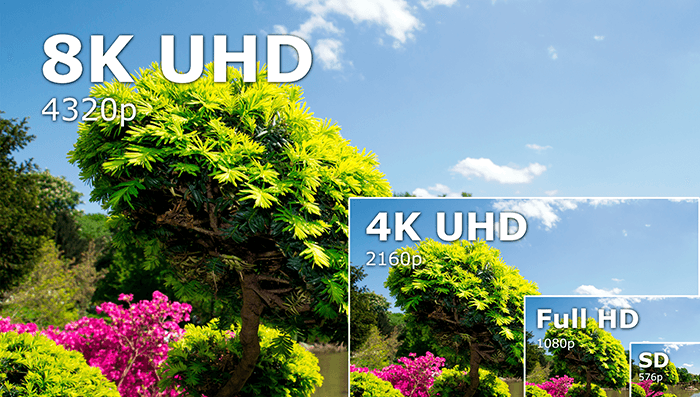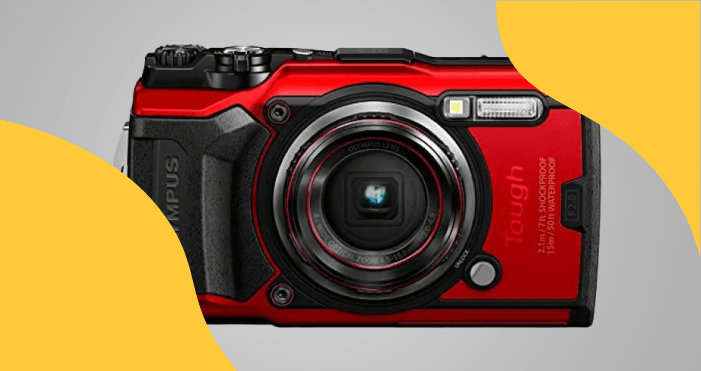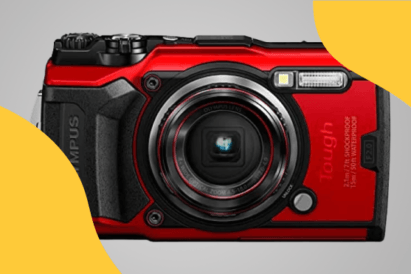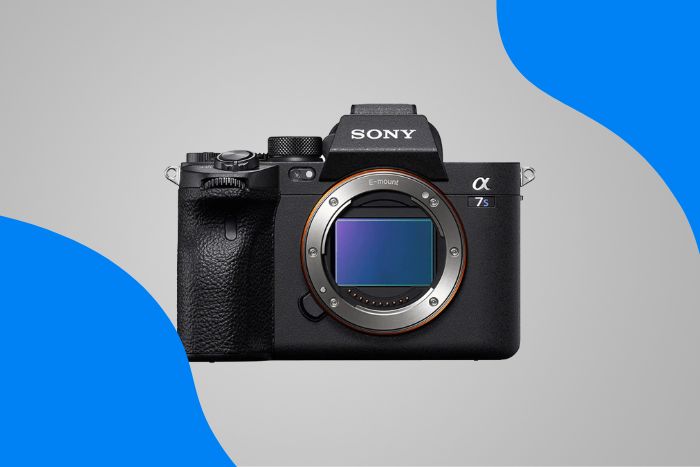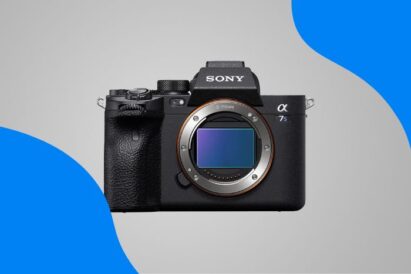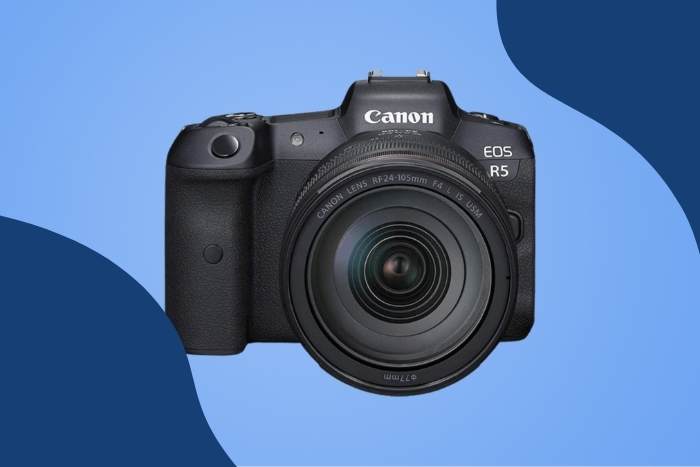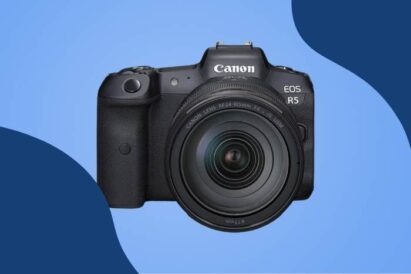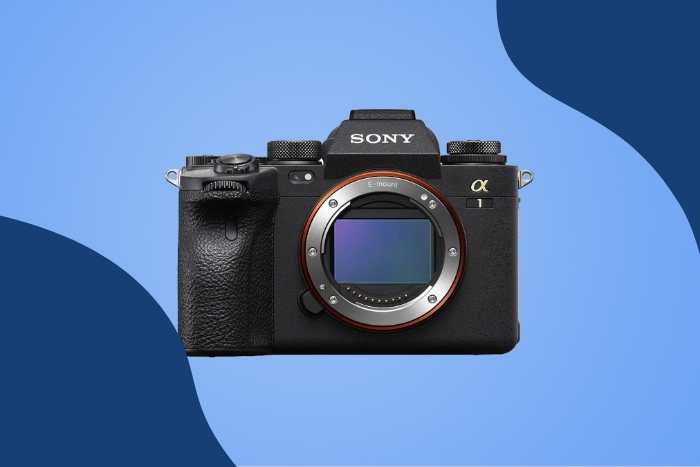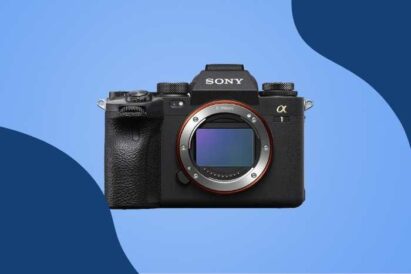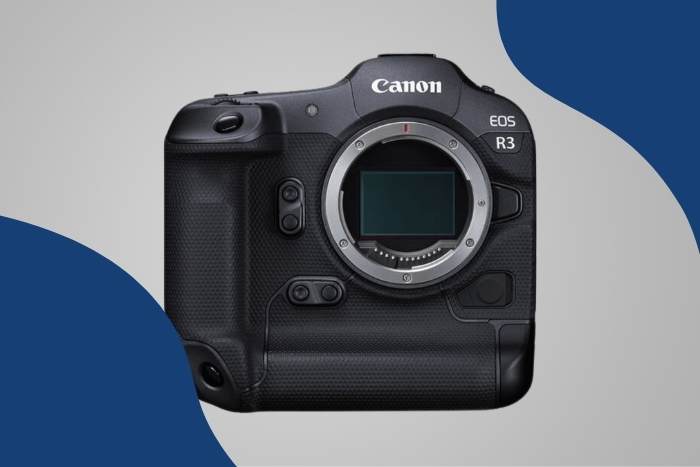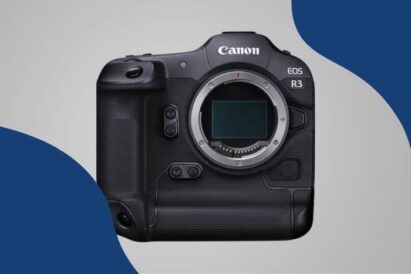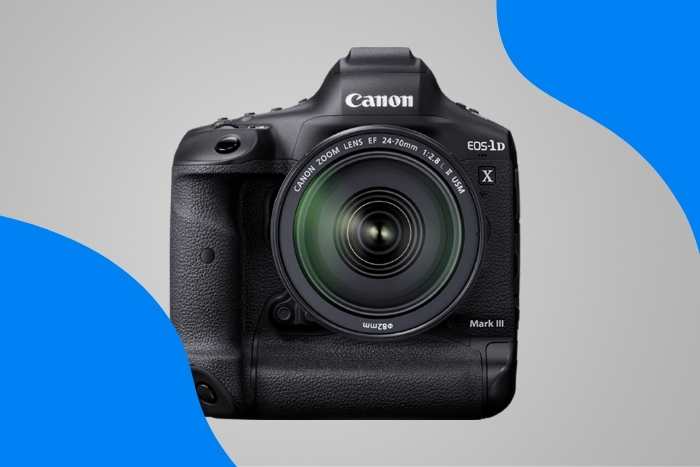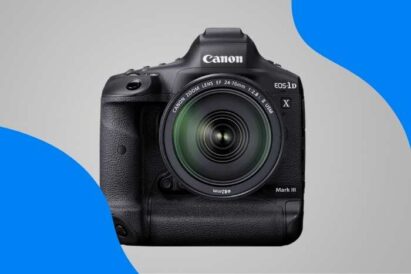Are you interested in getting your hands on one of those new high-resolution 8K cameras you keep hearing about but are unsure which one will work best for you? The available options are still limited and their prices and performance vary greatly. Finding the perfect 8K camera can be a challenge.
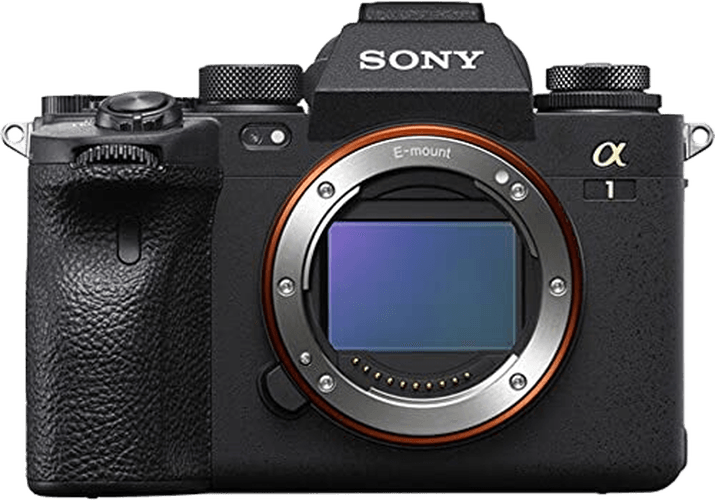
Sony a1
That’s where we come in!
After a lot of extensive research, we’ve compiled this detailed list of the best 8K video cameras. There is something here for everyone with excellent hybrid cameras that shoot still photography and video, high-end cinema cameras, 360° cameras, and drones.
What is the Best 8K Camera for Video to Buy in 2023?
Before we go into each of the cameras in detail, check out an overview of our top five 8K cameras below:

- Superb video and image quality
- Upgraded menus are the best of any Sony camera
- World-class autofocus performance
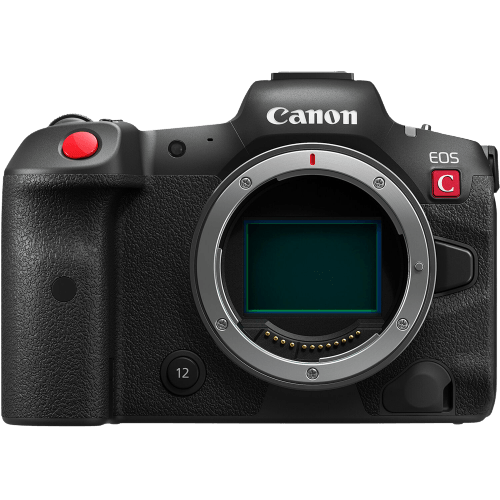
- The photo/video switch allows you to easily switch between shooting modes
- Built-in fan to prevent overheating
- Cinema RAW Light video options
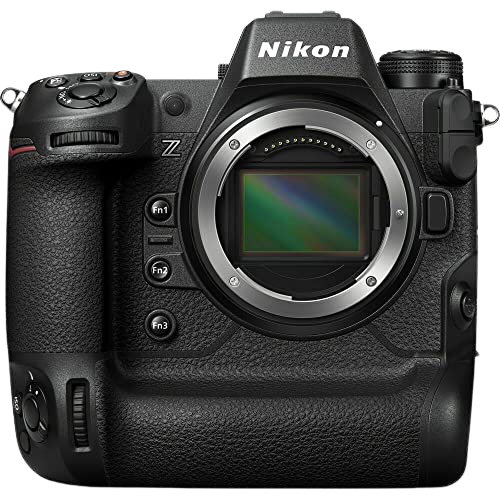
- Sharp videos and still images
- Wide dynamic range score
- Very impressive max burst speed
- Endless lens options
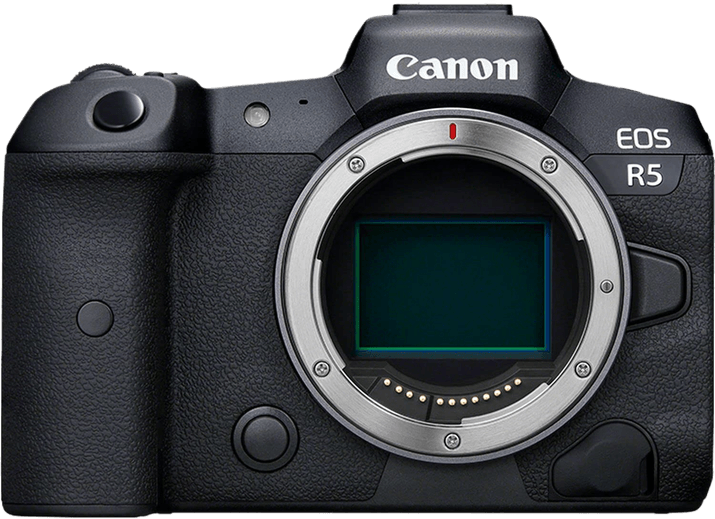
- Outstanding video and image quality
- Bright and bold colors
- Excellent autofocus system
- Incredible battery life
- Built-in image stabilization
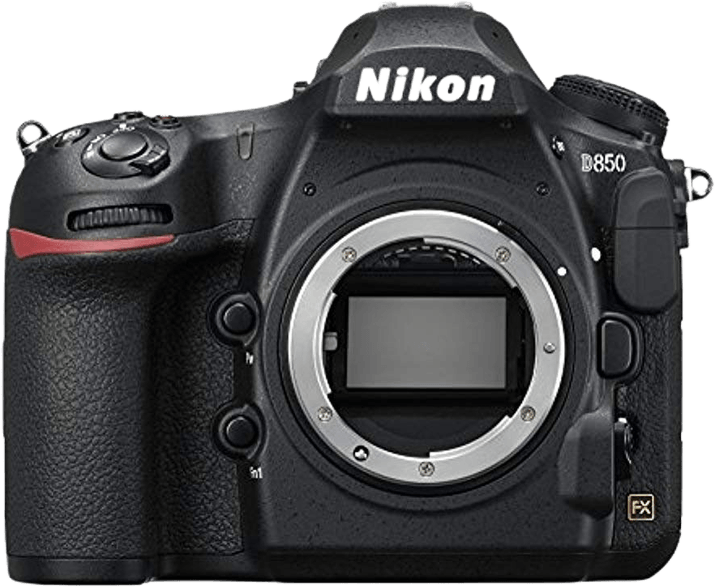
- Attractive price
- 8K time-lapse videos
- High-resolution sensor
- Superb autofocus performance
11 Best 8K Cameras in 2023 (in Detail!)
Below is our comprehensive list of all the best and most popular 8K cameras currently on the market. Let’s dive in and find out where each camera excels, where they could be improved, and more!
1. Sony Alpha 1 (Best 8K Camera)

| Camera Type |
Camera Type
|
| Megapixels |
Megapixels
50.1 MP |
| Sensor Format |
Sensor Format
|
| Sensor Size |
Sensor Size
24 x 35.9 mm
|
| Frame Rate |
Frame Rate
30 fps |
| Autofocus Points |
Autofocus Points
759 |
- Large sensor captures tons of detail
- High frame rate of 30 fps
- Eye tracking (human, animal, and bird)
- Easy customization
- Silent shooting for quiet situations
- Incredible 8K/30p Ultra HD video
- Expensive
- Highest frame rates only for JPEG, HEIF, and lossy compressed RAW files
- Eye tracking only selected manually
- Small rear LCD screen
- No GPS
The Sony a1 is a hybrid interchangeable lens camera boasting a 50.1MP full-frame CMOS sensor and a powerful Dual Bionz XR image processing engine. It is Sony’s flagship mirrorless camera and an absolute workhorse that excels at both still photography and video shooting.
No other 8K camera can match the Sony A1’s full lineup of photo and video features. This makes it the ideal choice for professionals who split their time between photo and video work evenly.
Looking specifically at its video capabilities, the first thing that stands out is the 8.6K capture region. Video shot in 8K is uncropped and can be shot at frame rates of 24, 25, or 30 fps. Additionally, it can record 4K slow-motion videos at speeds up to 120 fps. The cherry on top of this fantastic 8K camera is the industry-leading hybrid autofocus. It does an excellent job of tracking and locking onto moving subjects in real time, even in video mode.
2. Canon EOS R5 C (Best 8K Canon Camera)

| Camera Type |
Camera Type
|
| Megapixels |
Megapixels
45 MP |
| Sensor Format |
Sensor Format
|
| Sensor Size |
Sensor Size
24 x 36 mm
|
| Frame Rate |
Frame Rate
20 fps |
| Autofocus Points |
Autofocus Points
1,053 |
- The photo/video switch allows you to easily switch between shooting modes
- 5-axis In-camera image stabilization
- Compact and lightweight
- Unlimited video recording due to built-in fan preventing overheating
- Reduced video sizes with Cinema RAW Light modes
- Expensive
- Limited native lens compatibility
- Continuous AF only covers 80% of the image sensor in video mode
- Bigger than the original EOS R5
- Must use an external battery source for the fastest shooting speeds
The Canon EOS R5 C is a brand new hybrid camera that Canon just announced in January of 2022. It takes all the best traits of the original Canon EOS R5 and adds advanced video features typically only found in Canon EOS cinema cameras. A 45MP full-frame CMOS sensor and an upgraded DIGIC X image processor are at its core.
The standard power switch has been replaced with a new “photo/video” switch that allows you to boot up the camera in two distinct shooting modes. When in photo mode, the camera takes sharp 45MP images. In video mode, it captures stunning 4K, 6K, or 8K videos. More noteworthy video features include 12-bit RAW video files, an active cooling system to prevent overheating, and dual-pixel autofocus.
3. Nikon Z9 (Best 8K Nikon Camera)

| Camera Type |
Camera Type
|
| Megapixels |
Megapixels
46 MP |
| Sensor Format |
Sensor Format
|
| Sensor Size |
Sensor Size
23.9 x 35.9 mm
|
| Frame Rate |
Frame Rate
30 fps |
| Autofocus Points |
Autofocus Points
493 |
- Ultra-fast image processor
- High, 120 fps compressed frame rate
- No visible rolling shutter
- Excellent battery life
- 8K/60p Ultra HD video
- Unlimited low-resolution recording
- Only 11 MP files at the highest frame
- You can only shoot RAW files at 20 fps
- Tracking can fail with erratic movement
- IBIS not as good as Canon R3
- Autofocus isn't as good for video
- The screen doesn't fully articulate
The Nikon Z9 is a professional 8K video camera, a high-speed sports camera, and a powerful wildlife camera packed into one mirrorless body. The camera is built around a 45.7MP full-frame stacked CMOS sensor. It delivers crystal clear images and videos and has the fastest readout times of any full-frame camera on the planet.
It can record 8K video footage at 30 or 60 fps using either 10-bit Apple ProRes or 12-bit ProRes RAW formats. Furthermore, it shoots oversampled 4K at up to 120 fps, and Nikon claims it can record continuously for over two hours. On the still side of things, thanks to a new 100% electronic shutter, it can shoot RAW bursts at 20 fps and JPEG bursts at an extremely impressive 120 fps.
4. Canon EOS R5 (Best 8K Camera for Stills)

| Camera Type |
Camera Type
|
| Megapixels |
Megapixels
45 MP |
| Sensor Format |
Sensor Format
|
| Sensor Size |
Sensor Size
23.9 x 35.9 mm
|
| Frame Rate |
Frame Rate
20 fps |
| Autofocus Points |
Autofocus Points
1,053 |
- Large 45 MP sensor
- High frame rate of 20 fps
- In-Body Image Stabilization (IBIS)
- Body, face, eye, and animal tracking
- 8K/30p Ultra HD video
- Expensive
- Complicated autofocus setup
- Noise reduction applied to RAW files
- Hard to customize
- Overheats shooting video
While the Canon EOS R5 lacks some of the premium video features of the new EOS R5 C, it remains a fantastic 8K camera in its own right. The two 8K cameras share an identical 45MP full-frame CMOS sensor, and the EOS R5 boasts a more sophisticated 5-axis image stabilization system that adds eight stops of exposure.
You won’t notice any substantial differences in the final video quality of the two cameras, but the EOS 5 lags behind in handling and workflow. It has a 30-minute capture limit, and even then, it sometimes runs into problems with overheating. But because of its smaller size, longer-lasting battery, and lower price, this is the better option if you primarily shoot stills.
5. Nikon D850 (Best All-Around 8K DSLR)

| Camera Type |
Camera Type
|
| Megapixels |
Megapixels
45.7 MP |
| Sensor Format |
Sensor Format
|
| Sensor Size |
Sensor Size
23.9 x 35.9 mm
|
| Frame Rate |
Frame Rate
7 fps |
| Autofocus Points |
Autofocus Points
153 |
- Fantastic overall image quality
- Excellent 3D continuous AF tracking
- Long, 1,840-shot battery life
- Durable, weather-sealed construction
- Sharp 4K/30p Ultra HD video
- No customizable shooting presets
- Slow autofocus in Live View
- Needs an expensive XQD card
- Rolling shutter noticeable in 4K video
- Slow 7 fps or 9 fps with an expensive battery grip
Finally, last but not least, we have the Nikon D850. While technically speaking, it is not an 8K video camera. But I decided to include it on this list because of its ability to create epic 8K time-lapse videos. These 8K movies are possible courtesy of the camera’s high-resolution 45.7MP sensor and its versatile built-in interval timer.
One important thing to note is that while 4K time-lapses can be generated in-camera, 8K time-lapses will need to be compiled externally during video editing in post-production. In terms of standard video, it records uncropped 4K/30p and 1080p/120p Full HD videos. One final thing worth highlighting is the off-the-charts battery life, rated at 1840 shots.
6. Blackmagic Design URSA Mini Pro 12K
(Highest Resolution 8K Video Camera)
Blackmagic Design makes some of the most sought-after 4K and 6K video cameras globally. And the URSA Mini Pro 12K is their highest-resolution video camera yet. In fact, not only is it their highest-resolution camera, it’s the only camera with 12K video capabilities currently available to consumers, regardless of brand.
It features a large 79.6MP CMOS sensor and shoots stunning 12K footage that can be sampled down to 8 or 4K during video editing using professional programs like Adobe Premiere Pro and Final Cut Pro. Alternatively, you can shoot 8K videos at 160 fps, 6K at 120 fps, and 4K at a mind-melting 220 fps. Its biggest downfall is the 3200 max ISO, which means it doesn’t perform exceptionally well in low-light conditions.
- Has the highest video resolution of any video camera currently available
- Uncropped 12K video capabilities
- Extremely durable construction
- Easy to use controls, menus, and interface
- Great value
- No ProRes video option
- Narrow ISO range
- Massive file sizes
- No stills capabilities
- Expensive
7. Z Cam E2-F8
(Most Affordable 8K Video Camera)
The Z Cam E2-F8 is a box camera that closely resembles the design of the Blackmagic URSA Mini Pro 12. What it lacks in name recognition, it more than makes up for in performance. It has a giant 61MP full-frame CMOS sensor that measures 35.97×23.98 mm. On top of that, it has no 8K recording limit, allowing you to work uninterrupted for as long as you want (or until your memory card is full).
Another thing to keep in mind is that it uses the Canon EF lens mount. This gives videographers access to a never-ending list of top-rated lenses perfect for video shooting. While there is no screen on the aluminum alloy body, the Z Camera app provides live previews with little to no lag and lets you quickly and easily adjust the camera settings.
- Cheapest 8K cinema camera on the market
- Tiny for a true cinema camera
- A handful of customizable buttons
- Responsive Z Camera app
- H.265 video files are smaller than most 8K files
- Confusing main menu
- Only one memory card slot
- Files sometimes appear choppy in Adobe Premiere Pro
- No stills capabilities
8. Insta360 Pro 2
(Best 360° 8K Video Camera)
The Insta360 Pro II is the successor to the original Insta360 Pro and the most advanced 360-degree camera ever created. While most of you have probably never heard of this camera, there’s a good chance you have seen one mounted on top of a Google car driving around taking footage for Google Street View.
In total, it features six f/2.4 fisheye lenses that work together to deliver sparkling 8K stereoscopic videos and 12K images. In addition, it has four microphones for improved audio performance and multiple ventilation points for extended shooting. A few more advanced features include optical image stabilization, live streaming capabilities, and VR support.
- 360° video footage
- Built for professional use
- Extensive controls
- Impressive image stabilization technology
- Live streaming capabilities
- Not the most user-friendly
- Slow startup and shutdown speeds
- Transmitter is sold separately
- Large and heavy design
- Expensive
9. Kandao QooCam 8K 360
(Best 8K Video Camera for Travel)
Turning to another 360-degree camera, we have the Kandao QooCam 8K 360. Pound for pound, it can’t compare with the specs of the previous camera, but it costs only a fraction of the price. Moreover, measuring 145x57x33 mm and weighing only 245 grams, it’s a pocket-sized camera ideal for travel and everyday use.
My favorite characteristic of this camera is its 8K widescreen video option. While shooting 360-degree videos is very cool, the ability to film standard high-quality footage with the same camera is incredibly convenient. Other key features worth noting include the touchscreen OLED, great image stabilization, and stunning image quality.
- Stunning video and photo quality
- 4K slow-motion video
- Excellent SuperSteady image stabilization
- Beautiful and natural-looking colors
- Attractive price
- Weak battery life
- The fan can be quite loud at times
- I would love further iterations to be waterproof
- Larger than most 360° cameras
- Unintuitive app design
10. Autel Robotics EVO II
(Best Drone 8K Video Camera)
DJI might be the dominant player in the drone world, but thanks to the release of multiple successful drones like the EVO II, Autel Robotics is starting to make a name for itself. The EVO II has a 48MP 1/2-inch Quad Bayer sensor and is the first 8K consumer drone to hit the market. In addition to 8K/25p, other max video resolution options include 6K/30p and 4K/60p.
Another awesome perk of this drone is the ability to remove the camera and attach a different Autel Robotics camera. And the cameras on the EVO II Pro and the EVO II Dual are two terrific options. More professional features are the advanced obstacle avoidance sensors, a 40-minute battery life, and a video transmission range of nine kilometers.
- First consumer drone with 8K video capabilities
- Superb battery life
- Compact and foldable design
- 3-axis gimbal for stabilization
- Obstacle avoidance technology
- Controller feels cheap
- Occasionally loses signal when using intelligent flight modes]
- No panoramic option
- DJI app is better
- Expensive
11. Sony Venice 2
(Best Professional 8K Video Camera)
For the hardcore professional filmmakers out there, the Sony Venice 2 may very well be the best 8K camera ever built. While it comes with an incredibly hefty price tag, if you have deep pockets and want the cream of the crop, this is it. As the only camera on this list to garner Netflix’s stamp of approval, it’s a go-to choice for big production houses and independent documentary filmmakers alike.
The 8.6K full-frame sensor is interchangeable and can be replaced with the 6K sensor from the previous Sony Venice. The addition of eight high-quality motorized ND filters makes the colors pop and helps deliver 16-stops of dynamic range. Lastly, it uses the Sony E lens mount system, which is perfect for photographers and videographers already using other Sony cameras.
- Unbelievable video quality
- Used by professional production companies around the world
- Beautiful color rendition
- Excellent dynamic range and low-light performance
- Interchangeable sensor system
- Overkill unless you are a professional
- Large and heavy (although smaller than the original Sony Venice)
- It takes time to learn how to be a camera operator
- No photo capabilities
- Very expensive
Our Verdict
While there are only a few cameras with 8K video capabilities currently available, you should consider getting one if you are a serious videographer, filmmaker, or content creator. They not only boast unrivaled video resolution, but many of them are among the top still photography cameras on the market.
Here’s a quick summary of the best 8K cameras we covered today.

Sony a1
Videographers who want the controls of a cinema camera but the portability of a mirrorless camera should opt for the Canon EOS R5 C.
The Blackmagic Design URSA Mini Pro 12K is the number one 8K camera for people who want the highest video resolution possible.
For professional filmmakers with an unlimited budget, the Sony Venice 2 is an 8K camera unlike any other.
Vloggers and content creators who work with 360° footage should choose the Insta360 Pro II or the Kandao QooCam 8K 360.
And lastly, landscape and adventure photographers will love the unique angles and the smooth videos captured by the Autel Robotics EVO II 8K camera.
Common Questions About 8K Cameras Answered:
Here are a few of the most common questions (and answers) people have when considering purchasing a new 8K camera.
What is an 8K Camera?
An 8K camera is any device that can record videos at resolutions of 8K (7680×4320 pixels) or higher. While it is still a relatively new technology, more and more 8K cameras are coming out every year.
At the moment, most 8K devices are high-end cinema cameras aimed at professionals. For the average consumer, only four mirrorless cameras and no medium format cameras with 8K capabilities currently exist. Outside of those, there are a handful of phones, drones, 360° cameras, and speciality devices that can capture images and 8K footage.
Is an 8K Camera Best for Video?
That depends! The simple answer, in terms of overall video resolution and picture quality, is yes. With four times as many pixels as a 4K video, another huge advantage is that you can initially record in 8K before oversampling the footage and playing it back in 4K or even 1080p Full HD. This technique leads to spectacular videos with even better quality than if you had initially shot them in 4K.
As to why 8K cameras might not always be the best for video, there are two primary reasons. The first is that very few monitors can even display 4K videos in their original quality, let alone 8K. And the second reason is that 8K video files are massive. For reference, only one minute of RAW 8K video takes up an average of 121.5 GB.
How Much Does the 8K Camera Cost?
While there is quite a significant variance across the price ranges of 8K cameras, the one constant is that they are not cheap. All the 8K mirrorless cameras currently available are priced somewhere between $4000 and $7000. 8K cinema cameras are even more expensive, with some of them costing well over $50,000.
On the bright side, as 8K technology becomes more widely available in future years, the prices will drop. It wasn’t that long ago that 4K cameras were the new thing, and nobody could afford them, and now even most budget cameras feature 4K video.
If you are still not sure which camera to choose, try our posts on the best camera for music videos, the best video camera for sports, or the best Canon mirrorless for video next!

